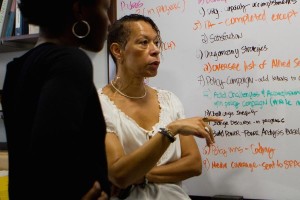
Psychology professor Cheryl Grills has been honored with a Magis Medal from national Jesuit honor society Alpha Sigma Nu. In celebration of its centennial anniversary, ASN awarded the medals for the first time ever, recognizing 100 distinguished members who exemplify the society’s commitment to scholarship, loyalty, and service.
An ASN member since 2008, Dr. Grills is the founder and director of LMU’s Psychology Applied Research Center, a current LA County Commissioner and the immediate past president of the Association of Black Psychologists. She is nationally recognized for her work in community psychology; last year she traveled to Missouri to lead a series of free workshops and trainings to support healing in the wake of the Ferguson decision.
A clinical psychologist by training, Grills shifted her focus to community psychology when she saw its potential to positively impact marginalized communities. “Rather than trying to locate the issue and the resolution within individuals, we figure out why so many individuals are experiencing these challenges,” explained Grills. “Our lab very much focuses on addressing root causes. We primarily work on projects that deal with social justice issues, addressing public policy and environmental change.”
Projects under Grills’ direction have tackled issues ranging from childhood obesity and education reform to health care and social support services for the homeless. One common thread that runs through them, though, is meaningful student involvement. In an engaged learning course she taught last semester, Grills had undergraduate students create a re-entry class for women at a local detention center, helping the women prepare for release by connecting them to their communities. An evaluation presented to the L.A. County Sherriff’s Department showed significant change in the women’s readiness for re-entry as a result of the program, and even caught the attention of a task force at the U.S. Department of Justice.
Grills notes that this kind of prosocial engagement is a win-win for both LMU students and the communities they serve. “People underestimate what students can do and the valuable contribution they can make to the lives of others,” said Grills. “But I have found that each time I present the challenge to them, they rise to the occasion.”



